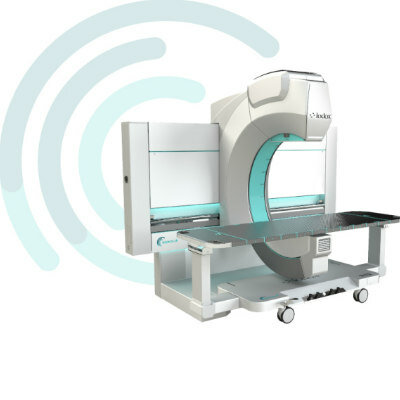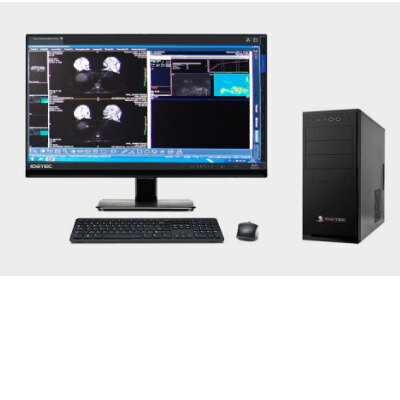Smart Scanning Mirror Constructs 3D Body Model
|
By MedImaging International staff writers Posted on 16 Aug 2018 |

Image: A novel mirror-based system creates 3D models of the human body (Photo courtesy of Naked Labs).
A novel three-dimensional (3D) body scanner with a connected rotating scale and companion mobile app enables users to track how their bodies change over time.
The Naked Labs (San Francisco; CA, USA) Naked 3D body scanner is a full-length body mirror that uses three Intel RealSense depth sensors to construct a user's unique 3D body model. The model is created by using the rotating weight scale to turn the user a full 360 degrees during a 15-second period. After scanning, the model can be viewed in the accompanying app to see a holistic suite of metrics, including body fat percent, lean mass and fat mass, circumferences, side-by-side comparisons, and graphs of historical data.
A built-in class 1 laser pointer is used to align the rotating scale before scanning, and a full-color light emitting diode (LED) ring is used to communicate instructions and feedback during the body scan. The software runs on an Intel x86 processor with 4GB RAM and stored on a 64GB SSD. Linkage to the Apple iOS 8 and above and Android Lollypop apps is available both via Wi-Fi and Bluetooth connectivity. The scanning mirror is powered via an AC socket or via the rechargeable 2200mAh lithium-ion battery. A fully charged scale will last for approximately 100 scans.
“We have been looking forward to this day for a long time. Today, people are searching for evidence-based methods to track health and fitness that aren't solely focused on weight,” said Farhad Farahbakhshian, co-founder and CEO of Naked Labs. “We are excited to get Naked into people's homes to give them better insight into exactly what's going on in their body and help them work towards their goals.”
“We are pleased to provide Naked Labs with Intel RealSense technology,” said Sagi BenMoshe, vice president and general manager of the Intel RealSense Group. “This is a great example of how we are enabling our customers to build products that enrich people's lives through devices and machines that perceive the world in 3D.”
Related Links:
Naked Labs
The Naked Labs (San Francisco; CA, USA) Naked 3D body scanner is a full-length body mirror that uses three Intel RealSense depth sensors to construct a user's unique 3D body model. The model is created by using the rotating weight scale to turn the user a full 360 degrees during a 15-second period. After scanning, the model can be viewed in the accompanying app to see a holistic suite of metrics, including body fat percent, lean mass and fat mass, circumferences, side-by-side comparisons, and graphs of historical data.
A built-in class 1 laser pointer is used to align the rotating scale before scanning, and a full-color light emitting diode (LED) ring is used to communicate instructions and feedback during the body scan. The software runs on an Intel x86 processor with 4GB RAM and stored on a 64GB SSD. Linkage to the Apple iOS 8 and above and Android Lollypop apps is available both via Wi-Fi and Bluetooth connectivity. The scanning mirror is powered via an AC socket or via the rechargeable 2200mAh lithium-ion battery. A fully charged scale will last for approximately 100 scans.
“We have been looking forward to this day for a long time. Today, people are searching for evidence-based methods to track health and fitness that aren't solely focused on weight,” said Farhad Farahbakhshian, co-founder and CEO of Naked Labs. “We are excited to get Naked into people's homes to give them better insight into exactly what's going on in their body and help them work towards their goals.”
“We are pleased to provide Naked Labs with Intel RealSense technology,” said Sagi BenMoshe, vice president and general manager of the Intel RealSense Group. “This is a great example of how we are enabling our customers to build products that enrich people's lives through devices and machines that perceive the world in 3D.”
Related Links:
Naked Labs
Latest General/Advanced Imaging News
- New AI Method Captures Uncertainty in Medical Images
- CT Coronary Angiography Reduces Need for Invasive Tests to Diagnose Coronary Artery Disease
- Novel Blood Test Could Reduce Need for PET Imaging of Patients with Alzheimer’s
- CT-Based Deep Learning Algorithm Accurately Differentiates Benign From Malignant Vertebral Fractures
- Minimally Invasive Procedure Could Help Patients Avoid Thyroid Surgery
- Self-Driving Mobile C-Arm Reduces Imaging Time during Surgery
- AR Application Turns Medical Scans Into Holograms for Assistance in Surgical Planning
- Imaging Technology Provides Ground-Breaking New Approach for Diagnosing and Treating Bowel Cancer
- CT Coronary Calcium Scoring Predicts Heart Attacks and Strokes
- AI Model Detects 90% of Lymphatic Cancer Cases from PET and CT Images
- Breakthrough Technology Revolutionizes Breast Imaging
- State-Of-The-Art System Enhances Accuracy of Image-Guided Diagnostic and Interventional Procedures
- Catheter-Based Device with New Cardiovascular Imaging Approach Offers Unprecedented View of Dangerous Plaques
- AI Model Draws Maps to Accurately Identify Tumors and Diseases in Medical Images
- AI-Enabled CT System Provides More Accurate and Reliable Imaging Results
- Routine Chest CT Exams Can Identify Patients at Risk for Cardiovascular Disease
Channels
Radiography
view channel
Novel Breast Imaging System Proves As Effective As Mammography
Breast cancer remains the most frequently diagnosed cancer among women. It is projected that one in eight women will be diagnosed with breast cancer during her lifetime, and one in 42 women who turn 50... Read more
AI Assistance Improves Breast-Cancer Screening by Reducing False Positives
Radiologists typically detect one case of cancer for every 200 mammograms reviewed. However, these evaluations often result in false positives, leading to unnecessary patient recalls for additional testing,... Read moreMRI
view channel
PET/MRI Improves Diagnostic Accuracy for Prostate Cancer Patients
The Prostate Imaging Reporting and Data System (PI-RADS) is a five-point scale to assess potential prostate cancer in MR images. PI-RADS category 3 which offers an unclear suggestion of clinically significant... Read more
Next Generation MR-Guided Focused Ultrasound Ushers In Future of Incisionless Neurosurgery
Essential tremor, often called familial, idiopathic, or benign tremor, leads to uncontrollable shaking that significantly affects a person’s life. When traditional medications do not alleviate symptoms,... Read more
Two-Part MRI Scan Detects Prostate Cancer More Quickly without Compromising Diagnostic Quality
Prostate cancer ranks as the most prevalent cancer among men. Over the last decade, the introduction of MRI scans has significantly transformed the diagnosis process, marking the most substantial advancement... Read moreUltrasound
view channel
Deep Learning Advances Super-Resolution Ultrasound Imaging
Ultrasound localization microscopy (ULM) is an advanced imaging technique that offers high-resolution visualization of microvascular structures. It employs microbubbles, FDA-approved contrast agents, injected... Read more
Novel Ultrasound-Launched Targeted Nanoparticle Eliminates Biofilm and Bacterial Infection
Biofilms, formed by bacteria aggregating into dense communities for protection against harsh environmental conditions, are a significant contributor to various infectious diseases. Biofilms frequently... Read moreNuclear Medicine
view channel
New SPECT/CT Technique Could Change Imaging Practices and Increase Patient Access
The development of lead-212 (212Pb)-PSMA–based targeted alpha therapy (TAT) is garnering significant interest in treating patients with metastatic castration-resistant prostate cancer. The imaging of 212Pb,... Read moreNew Radiotheranostic System Detects and Treats Ovarian Cancer Noninvasively
Ovarian cancer is the most lethal gynecological cancer, with less than a 30% five-year survival rate for those diagnosed in late stages. Despite surgery and platinum-based chemotherapy being the standard... Read more
AI System Automatically and Reliably Detects Cardiac Amyloidosis Using Scintigraphy Imaging
Cardiac amyloidosis, a condition characterized by the buildup of abnormal protein deposits (amyloids) in the heart muscle, severely affects heart function and can lead to heart failure or death without... Read moreImaging IT
view channel
New Google Cloud Medical Imaging Suite Makes Imaging Healthcare Data More Accessible
Medical imaging is a critical tool used to diagnose patients, and there are billions of medical images scanned globally each year. Imaging data accounts for about 90% of all healthcare data1 and, until... Read more
Global AI in Medical Diagnostics Market to Be Driven by Demand for Image Recognition in Radiology
The global artificial intelligence (AI) in medical diagnostics market is expanding with early disease detection being one of its key applications and image recognition becoming a compelling consumer proposition... Read moreIndustry News
view channel
Bayer and Google Partner on New AI Product for Radiologists
Medical imaging data comprises around 90% of all healthcare data, and it is a highly complex and rich clinical data modality and serves as a vital tool for diagnosing patients. Each year, billions of medical... Read more





















